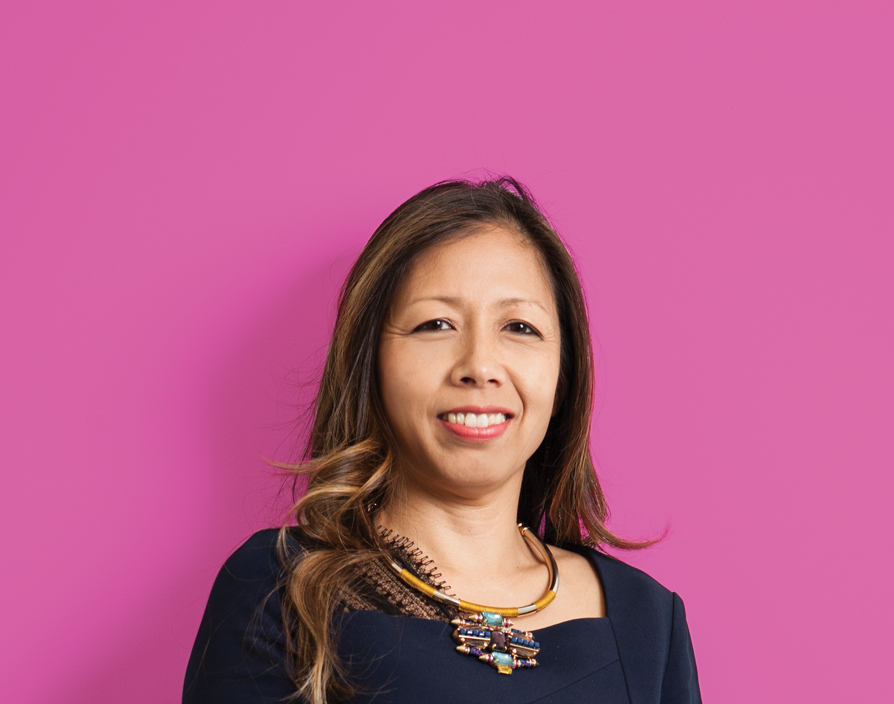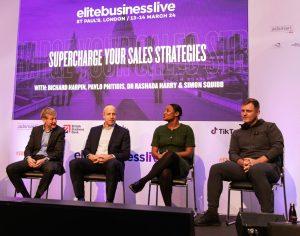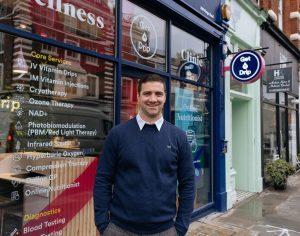Growing up in the 1980s, Wendy Tan White, co-founder of Moonfruit and general partner at Entrepreneur First (EF), didn’t have to look far to find examples of how women could excel in tech. “My mum was a woman in tech; so was her boss and her boss’s boss,” she says. “It seemed quite normal to me.” With her mother and father respectively working for the Digital Equipment Corporation and Racal, the company that would become Vodafone, having so many influential people on hand evidently had a marked impact on Tan White. She cut her teeth coding on a BBC Micro at age 11; by 16 she was polishing her programming skills via a postal correspondence course. “They’d give you a problem and you’d literally write out the program on a piece of graph paper, post it back and they would tell you whether you were right or not,” says Tan White. “Now that seems like a crazy way to code.”
Given Tan White’s childhood was so thoroughly steeped in tech, studying computer science at Imperial College seemed like the natural choice. And while at this time the world wide web was scarcely a glimmer in Tim Berners-Lee’s eye, university gave her a chance to explore this new frontier. “I was actually linked up to the early net,” she says. “I had a green-screen dumb terminal in my room at college that was linked to the local college wired area network.” But the course didn’t only offer Tan White the novelty of being able to play dungeon crawlers with gamers in the Valley: it also gave her a chance to work on graphical-user-interface design when much of the world was still facing screens full of blocky text. “It’s only looking back and realising the rest of the world hadn’t even seen the internet yet that you see how lucky you were to be able to access all of that,” she says.
After graduating in 1992, Tan White took a position at former Big Five accountancy firm Arthur Andersen & Co before going to work at AIT, a software consultancy building CRMs for major banks. And it was while working here that she caught the eye of Richard Duvall, CTO of Prudential, who recognised she’d be the perfect person to help launch its latest project: an online bank that went by the name of Egg. “For the first time, I truly got to see a new brand being created,” she says. “That was where I caught the startup bug.”
Helping to develop what was effectively one of the UK’s first fintech startups was a real eye-opener for Tan White, particularly when Egg was so hell bent on breaking all of the rules. Not only was the brand itself intentionally iconoclastic – Tan White recalls that BBH’s radical pitch ruffled more than a few feathers when it was first unveiled in Pru’s boardroom – but the new bank’s outlook flew in the face of the one-size-fits-all approach that was pervasive amongst its traditional bricks-and-mortar rivals. “It was all about the individual: the product was personalised to you,” she says. “Of course personalisation is everywhere now but in those days it was radical.”
And working at Egg led Tan White to a major revelation. While she was helping to build out the company’s CRM, part of her team’s remit was looking at how communities could be built online. But the entrepreneur began to realise that there was a major hurdle preventing the person on the street from expressing themselves on the internet. “There was no blogging and there were no website builders,” she says. “If you couldn’t code, you couldn’t publish.” For some years Tan White and Eirik Pettersen, a friend from her university days, had been kicking back and forth ideas for businesses they’d like to start up and they realised that helping non-coders create their own sites offered the perfect opportunity. “The idea was that there must be some way for non-developers to share their passions online,” she says. “That’s how we came up with the idea for Moonfruit.”
After Pettersen and Tan White raised some funds from friends and family, they were looking for someone to build a prototype for the new plug-and-play-web design tool. And one name sprang to mind. During her time at Egg, Tan White had hired agency Sixzeds to build out the bank’s intranet: the entrepreneurs realised Joe White, the company’s co-founder and Tan White’s future husband, was the talent they needed to drive their tech forward. Coming on board as their business partner, White whipped up Moonfruit’s first prototype, which the entrepreneurs took to the Bain & Company incubator Bain Lab. “They actually funded us by passing the hat around all the partners – they literally said ‘this is a cool idea: why don’t you just put a bit of money in?’” Tan White recalls. “That was our first £400k.”
Given every other website builder available at the time required serious coding skills, it was hardly a surprise that the launch of Moonfruit caused people to sit up and take notice. “We’d made it design-led: you could just drag and drop and make it look great,” says Tan White. “People had never come across something like that before.” Thanks to this word of mouth and a huge spread in the Guardian’s G2, Moonfruit’s user base started to grow rapidly. But it was when the startup raised another £6.5m from LVMH, (Moët Hennessy Louis Vuitton) and Macromedia – the company that would become Adobe – that things really reached a fever pitch. One of the conditions of receiving the money was that the entrepreneurs would invest some of it in running some TV spots for the new business. “That’s what LVMH usually did with their fashion brands,” Tan White says. “But for the average startup, doing a £2m TV campaign was nuts.”

For a while, Moonfruit was flying high. “We went through a very high inflexion,” she says. “It’s classic dotcom: we got lots of users, lots of publicity and very little revenue.” As with many tech businesses of the time, Moonfruit’s monetisation strategy was built around amassing users and attempting to target them with advertising. However, the online advertising industry was still in its infancy: without today’s sophisticated targeting and real-time bidding it was far harder for online services to maximise their ad revenue. “It just wasn’t enough to sustain a 60-person business,” Tan White says. “And then the crash came.”
Without a doubt, this was a difficult time in Tan White’s journey. “Emotionally I found it hard,” she says. “If I look back now I was probably depressed: it took me a year or so to come out of that.” Keeping the company afloat required some brutal restructuring: Moonfruit shrank from 60 people to just two and even White had to temporarily step aside to allow the business to stay afloat. But while this was a tough decision, it gave the startup time to pivot to a subscription model – something that ultimately helped turn its fortunes around. “It’s the customer base that saved us really: enough of them loved it and said they’d pay to use it that it kept us going,” says Tan White. “It meant we could grow the business organically.”
After spending three years building the business back up, in 2004 Tan White got pregnant, leading White to suggest he tag in as CEO while she took her maternity leave. Never one to rest on her laurels, Tan White decided to use this as an opportunity to return to her studies. “I did a master’s course in future textile design at Central Saint Martins” she says. “I was really looking at colour-changing fabrics and soft sensors; I loved the creativity and the exploration of it.” By the time Tan White graduated, White had grown Moonfruit back up to ten people and the business was approached by Lycos to consider a leveraged buyout and merger with the domain registrar Gandi. “It was a ¤13m raise and I helped introduce investors to do that deal: Joe and Eirik tripled the value of the group over four years, then they persuaded me to come back to have a look at the business before I went on to do my own thing,” says Tan White. “Of course I got totally sucked back in.”
In 2010 Tan White retook the helm at Moonfruit, just as another startup was in the ascendent: Twitter. Realising the enormous potential the micro-blogging platform had, Moonfruit decided to run a short competition giving away ten MacBook Pros. “We just pushed out a little campaign, which asked ‘what is Moonfruit?’ into the Twittersphere,” she says. “The first tweet that came back was ‘is it a gay astronaut?’” Before long the company was inundated with tweets of cartoon strips and photos of individuals dressed as moons eating fruit; a young Charlie Puth even tweeted them a song. This campaign resulted in Moonfruit trending for seven days. “At the peak, 2.5% of all tweets were about Moonfruit,” says Tan White. “We had 400 tweets a second coming in and we looked at them all: it was just crazy.”
Not only did this have the effect of creating a 20% uptick in subscriptions over a single weekend but it also created a substantial user base for the brand in the States. “We had ISPs and US B2B customers wanting to distribute us,” says Tan White. “We just started to increase in size and scale.” Investors like 500 Startups’ Dave McClure began clamouring to back the company, while businesses like Intuit and GoDaddy started sizing it up for acquisition. But it was when Yell made an offer to purchase Moonfruit for $37m that the entrepreneurs knew it was time to let someone else take up the reins. “They had 1.3 million small businesses around the world that wanted to move online and they had a massive salesforce,” Tan White says. “We felt they were a great way of distributing globally in a way we never could.

Having stayed on to manage the transition, the entrepreneurs helped Yell to distribute Moonfruit’s platform and increase its revenue from $10m to $150m before finally stepping down in 2015. But while many would have kicked up their feet and taken a well-earned breather at this point, Tan White and White wanted to use some of the experience they had built up to further support the UK ecosystem.
Tan White’s first instinct was to enter government: she nearly accepted the role of chief cabinet officer until Labour peer Peter Mandelson counselled her and encouraged her to reconsider. “He said to me ‘it would be like running an oil tanker after running a speed boat’,” she says. “But the government was really supportive and said ‘why don’t you come onto our digital advisory board instead?’” Following on from this, Tan White was also invited onto the boards of Tech City UK and her alma mater Imperial College, before eventually going on to join that of the Alan Turing Institute late in 2016. “From a machine learning and artificial intelligence point of view, the professors there are doing some amazing work,” she says.
But Tan White didn’t just content herself with helping from afar. Having made some investments in AI, robotics, machine learning and IoT startups, she and White found their way onto the radar of Alice Bentinck and Matt Clifford, the co-founders of EF. And they were so impressed with the pre-seed investment programme’s model, that they eventually helped raise its new fund and joined as general partners. “Everybody has an exited entrepreneur as a mentor from the time they’ve formed a company right through demo day, fundraising and up to 12 months beyond,” says Tan White. “That’s quite unique.” And this isn’t the only area the programme has the edge. While EF has always focused on assembling teams of talented entrepreneurs, it now spends up to two years tracking and sourcing candidates: it’s increasingly bringing together PhD educated technologists and talented entrepreneurs with an industry edge. “We may have a great recipe for creating companies but that’s no good if you don’t have great ingredients,” says Tan White.
However, while much of the industry is waking up to the importance of sourcing the best ingredients for startups, many still seem to be neglecting one half of the pantry. “ Some cultures – like those surrounding gaming and brogrammers – have put women off tech,” says Tan White. “Women who have tried to get into it have sometimes felt quite isolated.” Having grown up surrounded by female tech role models, it’s hardly surprising that Tan White has dedicated much of her time to challenging this and championing tech as a potential career for young women. “We’re making inroads everywhere so I hope by the time my daughter comes out that it just won’t be an issue,” she says. “But it’s like all industries: you have to do positive things to shift that conversation and the more role models we have the better.”
Fortunately, it doesn’t seem like there’s any shortage of those. In 2016 Tan White was recognised alongside Bentinck, Love Home Swap founder Debbie Wosskow and Unruly founder Sarah Wood in the Queen’s birthday honours. “Honours are funny things,” she says. “But love them or hate them, having so many women in tech honoured in the last couple of years is a great thing.” And her MBE isn’t the only recognition that has been heaped on Tan White in recent times: she was named one of the Fifty Most Inspiring Women in European Tech by Inspiring Fifty in 2017 and Business Role Model of the Year at the Women in IT Awards just this January. Despite this, she emphasises that taking advantage of the opportunities these things present is far more important than the titles and gongs themselves. “It’s more about what you will do with that profile,” she says. “Can you carry on making a difference? That’s probably more what I’m interested in.”
While it may sound [counterintuitive] given that EF is helping to create some of the UK’s most disruptive AI and machine learning startups, one key area Tan White is keen to make a difference is the disruption caused by automation. “It won’t just affect lower paid labour jobs: it’s actually going to affect the middle classes as a whole,” she says. “So we need to think about the impact that has on education and what our future job roles will be.” Additionally, with tech increasingly consolidating capital in the hands of a wealthy few, Tan White believes that one of the biggest challenges facing us is the way we structure our economy. “The old mechanisms of redistribution through shareholder dividends or even taxation don’t seem to work anymore,” she says. “If that’s the way the future is going, somebody has an ethical, societal duty to find solutions.” ![]()
Share via:


















































